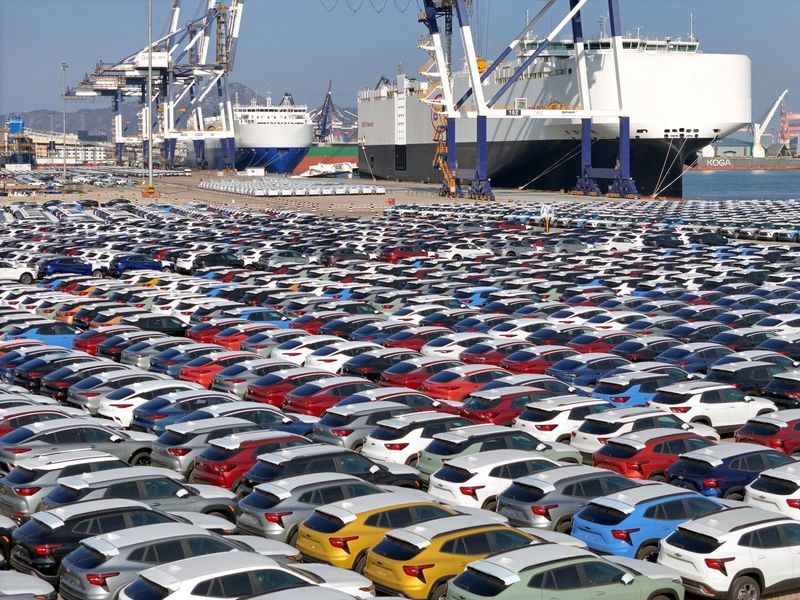(Reuters) - Retaliatory tariffs by China to the European Commission's proposed additional duties of up to 38.1% on Chinese-made electric vehicles could spell trouble for European carmakers.
Industry executives have warned against the tariffs, fearful of counter-tariffs or other measures which could affect the competitiveness of their cars in China at a time when they are already struggling to keep up with a growing number of domestic competitors in the EV market.
German carmakers are most exposed to potential counter-measures as trade data shows almost a third of their 2023 sales came from China. And while most vehicles sold in China are made locally, many top-end models are still imported from Germany.
Most exposed is Porsche, majority-owned by Volkswagen (ETR:VOWG_p). It has no production in China and imports all cars sold there, equivalent to 25% of global sales.
GERMAN CARMAKERS
Less than 5% of the 4.8 million vehicles delivered by Volkswagen, Porsche, BMW (ETR:BMWG) and Mercedes-Benz (OTC:MBGAF) to customers in China were exported in 2023, data from autos association VDA shows.
Reports have indicated a counter-tariff by China would apply to cars with an engine of 2.5 litres or larger. Cars imported to China of that size account for around 1% of VW sales, rising to 2% for BMW, 4% for Mercedes and 17% for Porsche, according to Stifel Research.
Still, given that exported cars tend to be higher-end models with substantial profit margins, Stifel estimates the negative impact on the German carmakers' operating profit (EBIT) would be significant at between 4-10%.
PORSCHE
Porsche cars are overwhelmingly produced in Germany, despite 25% of sales in China.
Still, Porsche's luxury branding could allow it to raise prices more than mass-market carmakers in the event of counter-tariffs being imposed, HSBC analysts said in a note this month.
Deliveries in China were down 15% last year to 79,283 vehicles, and suffered a further drop of 24% in the first quarter of 2024, a decline in part attributed to the difficult economic situation in the country.
Porsche is building a research and development site in Shanghai and premiered a tailored version of the Taycan for the Chinese market at the Beijing auto show.
VOLKSWAGEN
Volkswagen has the lowest exposure to counter-tariffs, with just 2.5% of cars sold in China made in Germany, its full-year statement shows.
Still, given its ambitions to protect and even boost its market share of 14.5% to 15% despite stiff competition from local carmakers, the company would suffer greatly under boycotts or other counter-measures to punish German companies in China.
Volkswagen Group China, including Porsche, and its Chinese joint ventures, sold more than 3.2 million cars in 2023, of which 3.06 million were locally produced.
Audi, Volkswagen's premium brand, has a slightly higher share of imported vehicles in local sales at just over 8%.
MERCEDES-BENZ
China is Mercedes-Benz's largest market for new car sales, accounting for around 36% of unit sales, just over 737,000 in 2023.
Just over 80% of cars sold in China in 2023 were made locally, with the rest imported. Its GLE SUV and S Class sedans are among the top three most popular imported cars in China alongside the Porsche Cayenne, according to data tracked by China Merchants Bank International.
Mercedes-Benz imports top-end models like the S-Class, GLC, G-Class and Maybach from Europe and the USA to China, where it prefers to build smaller cars like the A-class, E-class and C-class.
BMW
BMW generates nearly a third of vehicle sales in China, totalling just above 826,000, of which around 13% come from imported cars, its annual report shows.
Imported models from Germany include the i4, the 7 Series and the 5 series. The 'Neue Klasse', the carmaker's long-awaited new model series, will be produced locally from 2026.
BMW's China-made cars are produced by joint ventures including China's Brilliance Automotive, in which it holds a 75% stake, and a second JV with Great Wall Motor Co.
Both these JVs also produce vehicles for export to Europe, the iX3 and an electric Mini, which will be subject to the European Commission's tariffs.
EUROPEAN PEERS
Swedish carmaker Volvo (OTC:VLVLY) Car, majority-owned by China's Geely, generates a quarter of its unit sales in China but only around 10% of profits, HSBC analysts said.
Sales of imported vehicles make up about 4% of Volvo's Chinese sales, with the rest produced locally.
Franco-Italian Stellantis (NYSE:STLA) has one of the lowest regional exposures to China, with the exception of its recent investment in Chinese EV maker Leapmotor (HK:9863), with which it plans to export two EV models from China by year-end.
Like other luxury carmakers, all of Ferrari (NYSE:RACE)'s sales in China are imports - but these make up just 9% of global sales, with growth concentrated in the United States.
Stellantis-owned Ferrari could also leverage its pricing power to pass on tariffs to customers.
French automaker Renault (EPA:RENA) has low exposure to China, where it operates through joint ventures with Jiangling Motors and Brilliance Auto, and Nissan (OTC:NSANY) which has a market share of roughly 3%.
Its Dacia Spring EV is manufactured in China by local partner Dongfeng.

Renault and China's Geely announced a joint venture in May to develop combustion and hybrid engines.
(This story has been corrected to say that Mercedes-Benz' sales in China accounted for 36% of global total in 2023, not 30%, in paragraph 20)